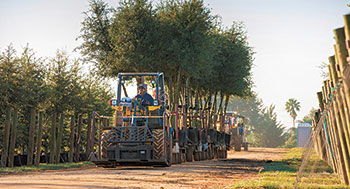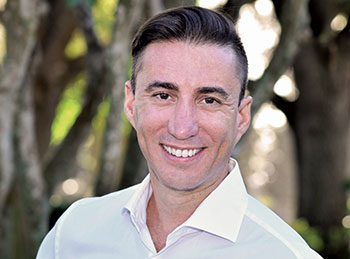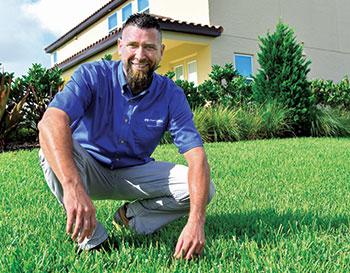
Cherrylake launched in 1985 as a humble citrus tree farm in Groveland, Fla., only to have many of its trees left in ruins by devastating freezes that wreaked havoc in central Florida in the 1980s.
The company did not give up then. Instead, it switched its offerings to ornamental trees, which are better able to tolerate unforgiving weather.
After taking root as a leading ornamental provider in the southeast market throughout the 1990s and early 2000s, the company branched out by offering landscape irrigation and contracting services in 2004.
“Because of the adversity and setbacks we’ve experienced with the citrus freezes, hurricanes, hailstorms and recessions, we feel it’s important to always be adding new profit centers to our business,” says Timothee Sallin, president of Cherrylake.
The company’s expansion didn’t stop there, however; Cherrylake added a third business unit in 2015 with its maintenance division.
“We’re taking full ownership from the time we break ground on a property to the end goal of maintaining that property,” says Ryan Ailes, operations leader for the maintenance division at Cherrylake.
Sallin adds, “Maintenance diversifies our risk because it’s somewhat recession proof. Ornamental trees and construction are tied to the housing market, so if there was ever a slowdown in the housing market, it would affect those two businesses; whereas with maintenance, the grass keeps growing no matter what.”

With all three of the company’s divisions holding strong, Cherrylake came in at No. 127 on the 2019 LM150 list, generating $15.6 million in 2018 revenue, a whopping 30 percent increase over 2017. It offers 60 percent design/build and installation, 30 percent irrigation and water management and 10 percent maintenance services to a 100 percent commercial clientele.
A bustling branch
A large part of the company’s growth stems from an all-inclusive maintenance contract it picked up in September 2018 with a local homeowner’s association (HOA). Cherrylake provides mowing services, edging, detailing, irrigation checks and maintenance to the 850-home HOA, which is about five miles down the road from the company’s headquarters.
The contract allowed the company to double its maintenance books and add three crews and an account manager.
Cherrylake also has streamlined its processes to help manage its recent growth. For example, the company specifies goals for crew members, such as the number of trees to be pruned or the number of yards to be mowed. The company then creates and regularly reviews dashboards to help hold employees accountable. It also measures items like quality of service, customer satisfaction, growth, top-line growth, sales, profitability and hours.
“You can improve what you measure,” Sallin says. “And in order to measure, you have to have clear goals. You have to have a good sense of what your vision is, what your purpose is, what your strategy is, so you can identify the most important things to measure.”
Once Cherrylake leaders began to track such items, they realized they could further benefit by implementing full-service maintenance crews, or “hybrid” crews. Before the switch, the company had crews designated solely for mowing, edging and weed eating, and a separate detail crew would later handle pruning shrubs, pulling weeds and trimming trees.
To enhance efficiency even more, the company provides crews with property flow maps and section detailing maps.

“We’re creating the maps so it’s uniform across the board for the property,” Ailes says. “We train the guys about how less movement can be more efficient. They’re finding that they’re not as tired because they’re not jumping from here to there around a property.”
Going hand in hand with the switch to hybrid crews came the idea of having maintenance crews work 10-hour, four-day workweeks, instead of eight-hour, five-day workweeks.
“The employees are thrilled because they get an extra day on the weekend, but they’re getting the same number of hours, and we’re happy because we’re putting fewer miles on our trucks, spending less on fuel and there’s less drive time, which cuts down on nonvalue added time for employees,” Sallin says.
Ailes adds that the number of overtime hours has been reduced by about 6 percent.
Labor, what else?
With such significant growth within the past few years, it’s not surprising that finding adequate labor has been top of mind for Cherrylake.
“Everything we do requires a tremendous amount of labor,” Sallin says. “So, that’s where you have to look at your processes, your drive time, your mobilization time. Do you have the right equipment? Those kinds of things help you be more efficient with labor.”
The company also works to please the employees it already has. It offers fair wages — often a dollar or two higher than competitors — a bonus referral program and opportunities for continuing education.
It also provides access to a bilingual coach, who conducts soft-skills training on items such as nonviolent communication and active listening. Additionally, the company provides weekly yoga classes and offers meditation sessions.
“We’ve created a really strong workplace, culture and brand, so we’re perceived in the community as a great place to work,” Sallin says.
He adds that the company looks to empower employees and practices a philosophy of self-management.
“We seek to give employees more freedom, more autonomy, more power to make decisions within the organization so they rely less on having a boss or manager telling them what to do,” Sallin says.
What’s next
Cherrylake is poised to grow by another 10 percent this year, but that’s not the firm’s only goal.
Sallin says the company hopes to grow its outsourcing division, the part of the business that buys and sells plants from other growers. It’s also considering opening a retail garden center to supplement its current profit centers. Ailes says he hopes to see the maintenance books double within the next three to five years. Cherrylake is looking into opening a satellite branch near north Orlando as well.
“Not only would that help us with travel time, but it would also open up the labor pool,” he says.
Read more:
To view the complete list, breakdowns and company profiles, check out a PDF version here.


